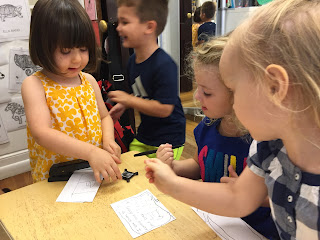“When we have a rich meta-strategic base for our thinking, that helps us to be more independent learners. If we don’t have those strategies, if we aren’t aware of them, then we’re waiting for someone else to direct our thinking.”
-Ron Ritchhart
 (kqed.org/thinking routines)
(kqed.org/thinking routines)
We are gathering to sit down for a meeting. The teachers have noticed a problem and wonder if the children might think of a plan to solve it. Or there is a beautiful and interesting material for the class to investigate. As the children's conversation begins to bubble, I hear someone complain that project time is boring. These expressions of boredom can appear as floppy disengagement or escalate to angry, yelling reactions.
-Ron Ritchhart
 (kqed.org/thinking routines)
(kqed.org/thinking routines)We are gathering to sit down for a meeting. The teachers have noticed a problem and wonder if the children might think of a plan to solve it. Or there is a beautiful and interesting material for the class to investigate. As the children's conversation begins to bubble, I hear someone complain that project time is boring. These expressions of boredom can appear as floppy disengagement or escalate to angry, yelling reactions.
I sometimes tell children that if a project feels boring they should help change it to something more interesting. It is surprising to me that anyone could feel bored, since project is the place where you can most make your own choices. It is here you can design your own learning, incorporate creative languages that you love best and can delve deeply into problems and puzzles that you uncover yourself. During projects children form theories and strategies to test their theories in small groups. Projects are anchored by a big idea and always take a winding path. This is uncertain work, to be sure. Sometimes group discussions go on a bit too long, but there is also a whole lot of choice and time for hands-on research and making things. Could it really feel boring?
While reading about thinking routines it hit me- maybe the 'boredom' children complain about during very interesting times at school is really a name used for frustration at not knowing how to start. Could helping children organize their thinking before entering a new project help them avoid the negative feelings?
In looking around I found that there is a lot more to boredom than I ever knew. Check out this article if you want to know about the five types of boredom and especially the two types that can make a person feel angry, as I sometimes see at school.
Here alternative activities are only limited by your effort to create them! I've been approaching children who tend to say they're bored during projects by talking about strategies before circles or small group work. I'm trying to model some of the Project Zero thinking routines Ron Ritchhart describes for helping people become 'meta-strategic thinkers'. Helping children connect aspects of project to things they already care about seems to have helped. I plan to get into the habit of asking all of the children what kind of thinking strategies they might be using when I see them pose a problem or figure something out. I hope this will help children feel more prepared to enter into projects, and feel happier about the uncertainties of new learning.
Here's the thinking routines article:
Here's the thinking routines article:

Thank you for this post and the link to the visible thinking/thinking routines. I had a good discussion with my classroom community by asking them, "What does it mean to be bored?" I found that they had concepts that were wildly different from my own and from one another. It was enlightening for us all! My favorite response from a five year old was "Bored is when there are so many things to do and you want to do them all and you can't."
ReplyDelete"Bored is when there are so many things to do and you want to do them all and you can't."
ReplyDeleteWow! That's just what I've come to realize- bored might not be a feeling of nothing to do, but a feeling of not knowing what to choose. Thanks for reading and commenting!
Thanks for posting this Anna and reminding us to listen to the children, especially when they say they are bored. Reading the blog and following the links have opened my eyes to rethinking about boredom and I can't wait to read more about strategies for making connections.
ReplyDelete